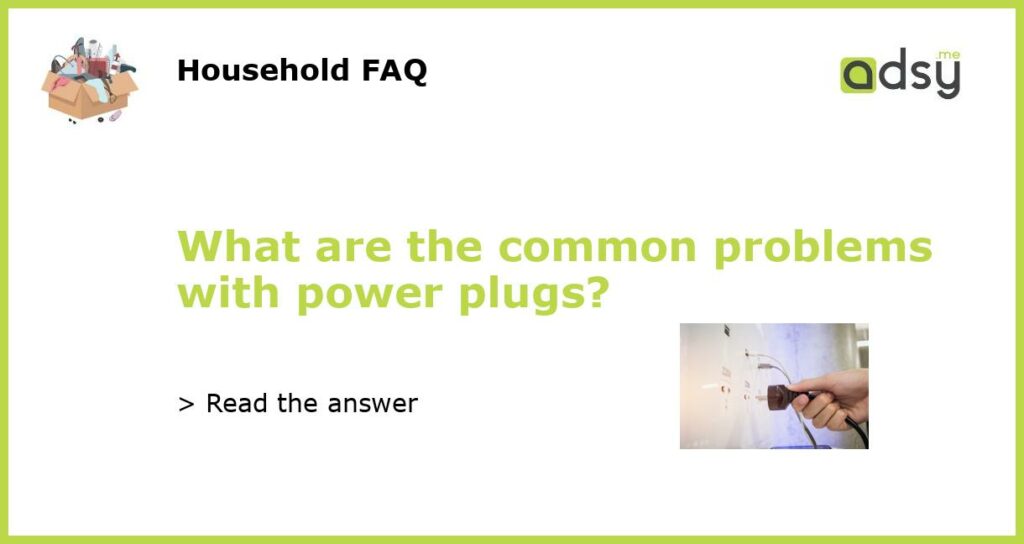Common Problems with Power Plugs
Power plugs are a crucial aspect of our daily lives, providing us with the ability to connect and power our electronic devices. However, like any other electrical component, power plugs can experience various issues that can disrupt their functionality and pose potential hazards. In this article, we will explore the most common problems with power plugs and discuss how to identify and fix them.
Loose or Damaged Pins
One of the most frequent issues encountered with power plugs is loose or damaged pins. Over time, the pins on power plugs can become loose, making it difficult to establish a secure connection with the socket. Additionally, pins can also become bent or broken, which can not only cause connection problems but also create safety hazards.
To address loose or damaged pins, it is important to first ensure that the power plug is unplugged from the socket. Gently inspect the pins for any signs of damage, such as bending or discoloration. If the pins are loose, they can often be tightened by gently squeezing them together using pliers. However, if the pins are damaged or broken, it is imperative to replace the plug entirely. This can be done by purchasing a replacement plug from a hardware store or contacting a professional electrician for assistance.
Wiring Issues
Another common problem with power plugs involves wiring issues. Over time, the internal wiring of the plug can become frayed or damaged, which can disrupt the flow of electricity and potentially cause fires or electric shocks. Identifying wiring issues can be challenging as they are not visible from the outside, but there are a few signs to watch out for.
If you notice frequent power outages, the plug feeling hot to the touch, or sparks when plugging or unplugging devices, it is likely that there is a problem with the wiring. In such cases, it is crucial to stop using the plug immediately and replace it. Attempting to fix wiring issues without proper knowledge and expertise can be dangerous, so it is advisable to consult a professional electrician for assistance.
Poor Contact with Socket
Poor contact with the socket is another prevalent problem that can affect power plugs. Sometimes, the pins on the plug may not make proper contact with the socket, resulting in intermittent power supply or no power at all. This issue can be caused by various factors, including debris or corrosion in the socket, worn-out pins, or a loose socket.
To rectify poor contact with the socket, start by cleaning the socket using a dry cloth to remove any dirt or debris. If the problem persists, check the pins on the plug for signs of wear and tear. If the pins appear worn or damaged, it may be necessary to replace the plug. If the socket is loose or showing signs of damage, it is advisable to contact a qualified electrician to replace or repair it.
Inadequate Grounding
Inadequate grounding is a problem that frequently occurs with power plugs. Grounding is essential for electrical safety, as it helps redirect excess electrical current away from the appliance and into the ground. If a power plug is not properly grounded, it can result in electrical shocks or damage to the connected devices.
To determine if a power plug is inadequately grounded, look for signs such as electrical shocks when touching the plugged-in device, vibrations or buzzing sounds, or damage to the plugged-in devices. In such cases, it is crucial to contact a qualified electrician to assess and address the grounding issue. Electricians can install an appropriate grounding system or suggest alternative solutions to ensure electrical safety.
Overheating
Lastly, overheating is a common problem that affects power plugs. When power plugs are used continuously for extended periods or overloaded with too many devices, they can generate excessive heat. This heat can damage the plug, the connected devices, or even start a fire.
To prevent overheating, make sure not to overload the power plug with too many devices. If you notice the plug becoming excessively hot or emitting a burning smell, unplug it immediately and allow it to cool down. Additionally, ensure that the plug is not covered or obstructed, as this can also cause overheating. If overheating issues persist, consult a professional electrician to assess the situation and provide appropriate solutions.






